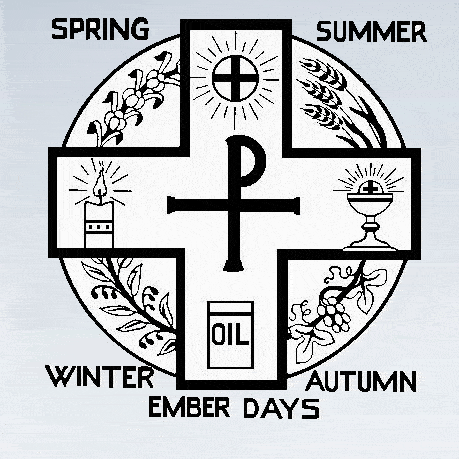

This is the song of the three children, who contend for the faith of the Trinity, and so were cast into the furnace. Levate.”, but the fifth one is introduced by “Dominus vobiscum.” In his Summa de Ecclesiasticis Officiis, Johannes Beleth writes in the mid-12th century that “Among these (prophecies) there is one which as it is being sung, no one ought to sit.

(During the octave of Pentecost, the reading is the same, but the canticle is substituted by an Alleluia with one versicle.) Medieval liturgical commentators offer a clever explanation as to why the prayers which precede the first four prophecies are introduced by “Oremus. One of the most beautiful features of the Masses of Ember Saturday is the canticle Benedictus es which follows the fifth prophecy from the Book of Daniel in Advent, Lent and September. From the website of the Bayerische Staatsbibliothek in Munich. At the bottom of the left column are read “angaria hiemalis” etc. The index of the Missal of Salzburg, printed at Nuremburg in 1498. Missals and breviaries printed for use in Germany do however also regularly use the Latin “Quattuor Tempora”. The noun “angaria” therefore means “a pressing into service” or “exaction” according to DuCange’s Medieval Latin Glossary, it was used in Germany to refer to a quarterly tax that was collected at the Ember Days. The first occurrence is in the Sermon on the Mount (Matthew 5, 41), “And whosoever will force thee one mile, go with him other two.” The other two are when Simon of Cyrene is forced to help the Lord carry His Cross, Matthew 27, 32 and its parallel in Mark 15, 21. This word derives from the verb “angariare – to press someone into service”, which occurs three times in the Latin New Testament. of winter), those of Lent the “angaria vernalis” etc. In German liturgical books of the Middle Ages, they are often called with an entirely different word, “angaria” for example, the index of the 1498 Missal of Salzburg calls the Ember Days of Advent the “angaria hiemalis”, (i.e. Some scholars claim it is merely a corruption of the Latin name “Quattuor Temporum – of the four times (or ‘seasons’)”, through the German “Quatember”, while others derive it from the Anglo-Saxon words “ymb-ryne”, meaning “regularly occurring.” English-speakers used also to refer to them as “Quarter tense”, another corruption of the Latin name. The origin of the English term “Ember Days” seems to be disputed.




 0 kommentar(er)
0 kommentar(er)
